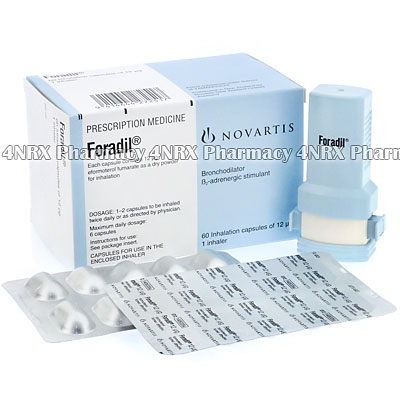 |
Home  Asthma Asthma  Foradil Aerolizer (Eformoterol Fumarate) Foradil Aerolizer (Eformoterol Fumarate) |
|
|||||||||
|
Foradil Aerolizer (Eformoterol Fumarate)
What is Foradil Aerolizer (Eformoterol Fumarate) used for? Foradil Aerolizer (Eformoterol Fumarate) is used to prevent bronchospasm in patients suffering from asthma, emphysema and chronic bronchitis, as well as being used to treat reversible obstructive airways disease, including nigh-time asthma. It is also used to prevent exercise induced bronchospasm. This drug is a type of bronchodilator, which works by helping to relax muscles in the airways, which in turn helps to improve breathing. However, it is not suitable for treating a sudden asthma attack. How should I use Foradil Aerolizer (Eformoterol Fumarate)? Foradil Aerolizer (Eformoterol Fumarate) is inhaled orally, using the included aerolizer inhalation device. Patients should consult their physician before using this medication, so that the correct dosage can be prescribed, and never exceed the dosage that has been prescribed to them. What are the side effects of Foradil Aerolizer (Eformoterol Fumarate)? Foradil Aerolizer (Eformoterol Fumarate) may cause some side effects to occur, such as:
This drug may also cause other more serious side effects to occur. Consult your physician immediately if you notice pain in the chest, shaking, a rapid pounding heartbeat, severe breathlessness or increased urination. Please Note Strictly follow all instructions provided to you by your physician or pharmacist while using Foradil Aerolizer (Eformoterol Fumarate). Optimum and safe dosage can differ based on the patient and the condition being treated. As this medication may be unsafe for certain patients, it is essential you always inform your physician if you are pregnant or breastfeeding, as well as if you have any allergies, other illnesses, or ongoing health conditions, and if you are taking any other form of medication, supplements, or herbal products. This medication should only be used if your physician has deemed it essential to your health. Immediately seek emergency medical care if you have any allergic or hypersensitive reaction. Common signs of a reaction include hives, swelling, skin rashes, chest pains, as well as trouble breathing or swallowing. 
|
|||||||||||||||||